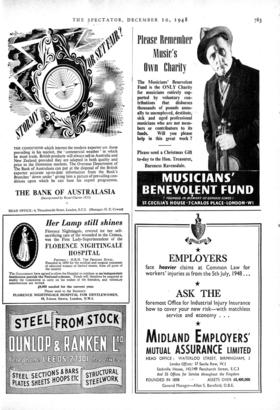The Modern Dilemma
THE core of this work is a marshalling of evidence from the history of religions in order to throw light on the problems of today. It assumes that the study is sufficiently advanced for certain broad conclusions to be drawn, without discussion of controversial matter, from a comparison of the most diverse cultures. This we will not question. In a brief review it will be better to indicate the lines of the author's thought than to attempt to criticise the detail of its historical basis. An acquaintance with one corner of the tremendous field in. which Mr. Dawson is at home suggests that intensive small-scale workers may fwd, each on his own pet subject, a few disputable assertions, which are however unlikely to be suffi- cient to affect the main thesis. On this thesis the reader may be advised to concentrate rather than regard the book (though a first glance might tempt him to do so) as a condensed manual of com- parative religion.
The first chapter traces the changes of outlook from the natural theology of humanism through the rise of the science of comparative religion to the rediscovery of the depths of mental experience by psychology (a study by no means wholly destructive of the validity of religious faith). Our present civilisation shows a cleavage more complete than ever in the 'past between " a world full of religious richness and depth but incapable of scientific demonstration " and the world of science, intelligible but " without spiritual depth or direct contact with religious truth." This " divorce between the psyche and the reason " is unnatural, and the bridge between them has throughout history been religion. Can religion play that part today, and, if so, how ?
The survey of religions which follows starts by emphasising the inadequacy of a purely historical and sociological approach which ignores the autonomy' of religious experience, the recognition of a transcendent reality, God, as the foundation of all religion. Later, there is an important criticism of anthropologists who belittle the religious elements in primitive behaviour and exalt the utilitarian, a process which " reverses the real sequence of primitive thought." Yet perhaps even because of the emphasis laid on the sense of the demonic as something primitive, one could wish to see a sharp distinction more consistently Maintained between God as a reality and the belief in God as a reality. Without other evidence for Mr. Dawson's views, one might almost think it sufficient for him (as it is often sufficient, a hostile critic might say, for his thesis) to suppose that belief in divine power is a primal and deep-rooted human instinct. Such an instinct might still be an illusion born of weakness. He actually describes God as " one of the primary psychological forces behind the whole culture process,". and even occasionally uses language which seems consistent with a philosophy of expedit esse dens. Knowing'bovi different is his intention, .and 'hipathisizig with it, one would like to see even this small handle p:r, ,t,, ;. secularist criticism removed. Again, is it not an over-statement
rotiding a similiar handle when he says that, if religious truth is aide the range of rational enquiry, then "the historical science YOligion lOses its value and becomes no more than an exploration
Ili series of spiritual culs-de-sac " ? Believers or unbelievers;. Ili and nothing ;human, even the history of human error, ld be alien to us or svithout its lesson and its interest.
e last chapter restates the dilemma. A religion of world- ciation, which adopts a purely negative attitude towards society, onises those elements which art its natural allies. Yet the ification of religion with its contemporary historical culture is to its spiritual and universal character and drains the life from ' d from society alike. • "How is this _Profound primitive intuition e dependence of human life,on the divine law to be separated the idolatrous identification of God's law with the terniaral tions of a particular age and society, without being ."also pirated from its vital connection with man's earthly, bodily .eXiSt- nee and transferred to a plane of inhuman abstraction ? " History, R; the author, gives an encouraging answer for the friiitful aboration of religion and culture has from the beginning been ernormal condition of human society. Even to have framed the e:stion lucidly is no small service. This is a fine piece of work, 'sionally difficult but always stimulating.
KEITH GUTHRIE.















































 Previous page
Previous page